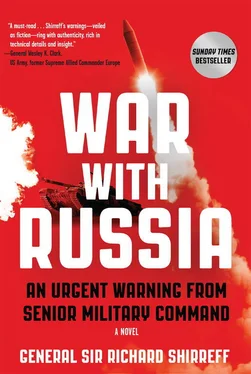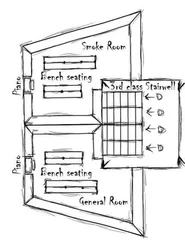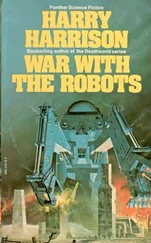And with that the screen went blank as communications were lost.
Group Captain Swinton, who had been monitoring the call from a remote set, stepped into the office. “Sir, I understand the news has got through to Brussels and the Sec Gen has called an emergency NAC meeting this afternoon at 1400. They’re expecting you to brief the training mission plan. The planning team are stood by now to take you through the briefing they’ve prepared.
“Sec Gen and the Chairman of the Military Committee would like to see you at 1330 for a chat before the NAC. Sergeant Jones is stood by with the car and police escort for 1230. And we’ll make sure there’s a sandwich in the car.”
“Thanks, Jamie. The briefing should be fairly straightforward as we’ve already war-gamed this scenario. But getting the Alliance to agree to a NATO training mission?” said McKinlay. “That sounds to me like one hell of a long shot.”
An hour and a half later, briefing with the planners completed, McKinlay had put on a tie and slipped into his formal, bemedaled, Lovat green tunic to conform with the normal custom for military officers attending the NAC. He was now sitting in the back of the BMW 7 Series F01 four-door sedan, the designated staff car for DSACEUR, as Sergeant Taff Jones, his Welsh Royal Logistic Corps driver, gunned the gears to stay close to the Belgian military police motorcycle outriders, who were carving their way, blue lights flashing and sirens wailing, through the heavy traffic on the N27 Brussels ring road.
“I suppose we have to travel like this,” mused McKinlay to himself as he tried to read through his slides and notes, while the top-heavy, armored vehicle swung sickeningly every time it cornered.
He arrived at NATO HQ, in the Boulevard Leopold III in the northeast of Brussels. As the car swept up to the main entrance, guarded by the flags of the twenty-eight member nations, he was met by one of SACEUR’s forward-based liaison team, an improbably tall, former professional basketball player, who had signed up to serve his country in the US Army following the attacks of 9/11.
“Hi, Sir. I’m Dan Rodowicz. I’ll see you through security.”
Two minutes later he was on the first floor of the utilitarian building and was shown into the Secretary General’s conference room.
Already waiting in the room was General Knud Vahr, Chairman of the Military Committee, a lean, wiry Danish cavalry general wearing parachute wings and with the piercing blue eyes of a latter-day Viking. “Greetings David. Thank you for making it over here so quickly.”
With time so short, McKinlay came straight to the point. “How do you recommend I play it with the Sec Gen and the NAC?”
“Play it straight. Sec Gen will open the meeting, commiserate with the Americans on the loss of their soldier, then ask me for the formal advice of the NATO Military Authorities. I’ll make a couple of points and ask you to brief us on the plan. Then Sec Gen will ask the ambassadors for their comments and questions and then there’ll no doubt be the usual lengthy discussion. As you know only too well, these guys just love the sound of their own voices and they’ll want a say. Just remember that you are a military professional and they are not. Do what you always do and stay in your lane and you’ll have no problems. And anyway, Sec Gen will keep a tight grip on the meeting. He thinks he’s running a government and that the ambassadors are his cabinet who’ll do as they’re told.”
At that moment the Secretary General entered. Radek Kostilek was a former prime minister of Poland. Gray-haired, high-cheekboned and with a humorous glint in his eyes, he was inclined to wear his heart on his sleeve and prone to overreact emotionally—particularly where Russia was concerned.
He sat down. “The Americans have got themselves into a hell of a fix this time and the Russians will use this as an excuse to have a go at NATO. On top of this kidnapping crisis, this American proposal for a combined NATO training team is just not going to run. The Germans for a start will see it as a knee-jerk reaction to the kidnap and they will push back. They pontificate about the importance of Alliance solidarity and then undermine it the moment the Americans really need their support. And as for the usual backsliders…”
The three men looked at one another and said nothing. Each knew the depth of frustration the others felt.
“General, what does SACEUR think?”
McKinlay updated him on his mid-air conversation with SACEUR and the key elements of the training-team proposal: multinational, based in Kiev and focusing on professionalizing the Ukrainian armed forces at the senior levels. He stressed that it met the lowest common denominator criterion of NATO and that all NATO Chiefs of Defense Staff had bought into the idea that morning. “I understand the political concerns,” he continued, “but I think we can allay ambassadors’ worries by emphasizing that this is not front-line support, nor any form of NATO boots on the ground.”
The Secretary General’s aide tapped his watch. It was time to move to the Council chamber.
At that moment, McKinlay saw, on the TV screen in the corner of the room, a CNN newsflash. Four pale, shocked figures in green jumpsuits; three men and one woman under a Russia Today news channel headline.
“Secretary General,” he said, “you might want to listen to this.”
The aide turned up the sound in time for the three men to hear the strident tone of the Kremlin’s chief propagandist, the Russia Today presenter Dimitry Kiselev, announcing in Russian, with English subtitles, that three American Special Forces, with a female signaler, had been captured inside Russia, having infiltrated across the Ukrainian border. The picture then cut to the smug, round-faced and smooth-cheeked Kiselev himself, working up an anti-NATO rant.
“We’ve seen enough. Time for the NAC,” said the now grim-faced Secretary General. “Let’s see if we can hold the Alliance together over this one.”
The three men left the conference room. The aides who had been waiting outside fussed around them like mother hens and they walked toward the Council chamber.
0700 hours, Friday, May 12, 2017
Briefing Room, Boryspill Air Force Base, Ukraine
“ANY FURTHER QUESTIONS, Phil?” asked the intelligence officer, as he concluded the briefing.
“No, thanks, I’m happy and good to go,” replied Major Phil Bertinetti, US Air Force. “I guess this should be fairly straightforward. We’ll get up to fifteen thousand feet and provide surveillance and reconnaissance overwatch for the American trainers looking after the Ukrainian weapon-locating battery operating behind the front line near Debaltseva.”
“Situation over the past few days has remained pretty quiet. There’s been the usual sporadic shelling from both sides, each reacting to the other, but the Russians are lying low after kidnapping our guys in Kharkiv. Any problems and you have the Quick Reaction Alert flight on the tarmac at immediate readiness,” the intelligence officer added.
Dark-haired and of medium height, while Bertinetti might look the part of a typical “top gun,” he was also a keen mountaineer who had summited the highest peaks in each continent, the Seven Summits challenge, before graduating from the Air Force Academy. A professional flyer to the core, with nearly 4,000 flying hours as a fighter pilot under his belt, his combat experience included Libya, Afghanistan and Iraq.
However, he reflected, those were conflicts where there’d been no one flying against them. He knew the Russians were good and he knew the Russians might be looking for him and his wingman that day. Here in Ukraine, it was his Exercise Red Flag “Top Gun” training above the Nevada desert—American pilots training against American instructors, simulating Russian tactics—that he might need to rely on now, if the Russians decided to take them on.
Читать дальше












